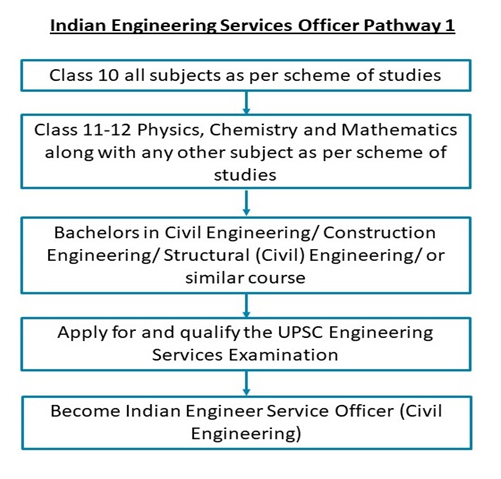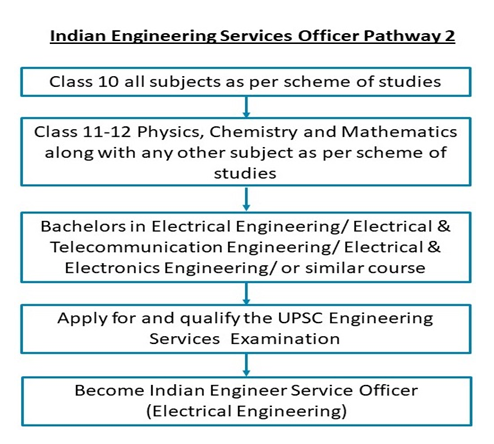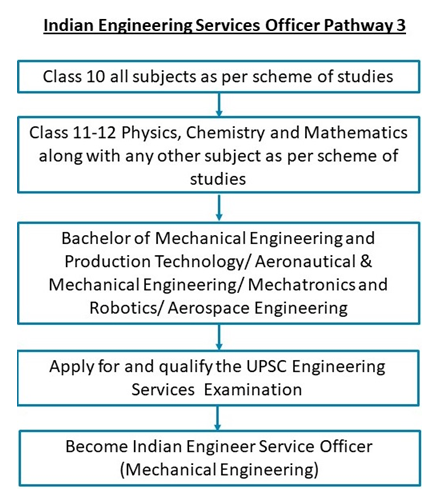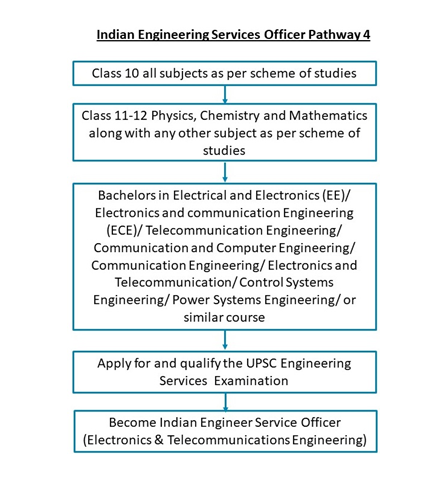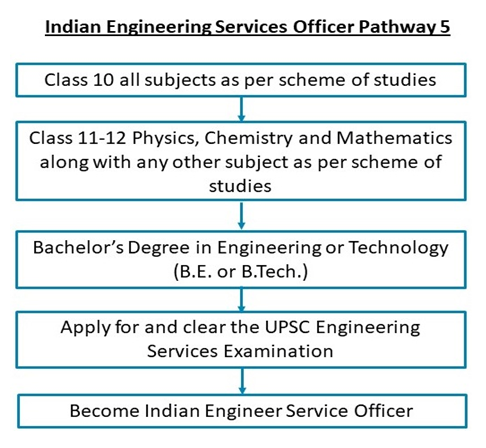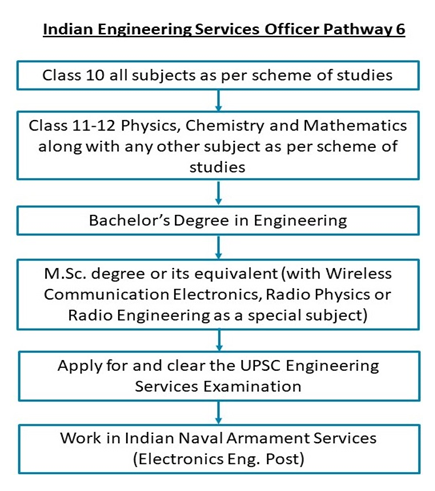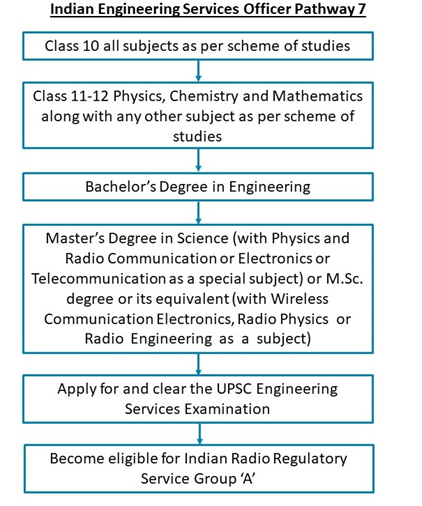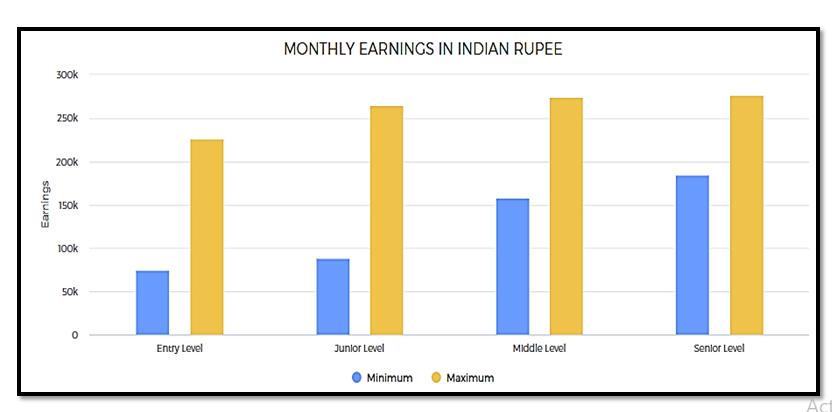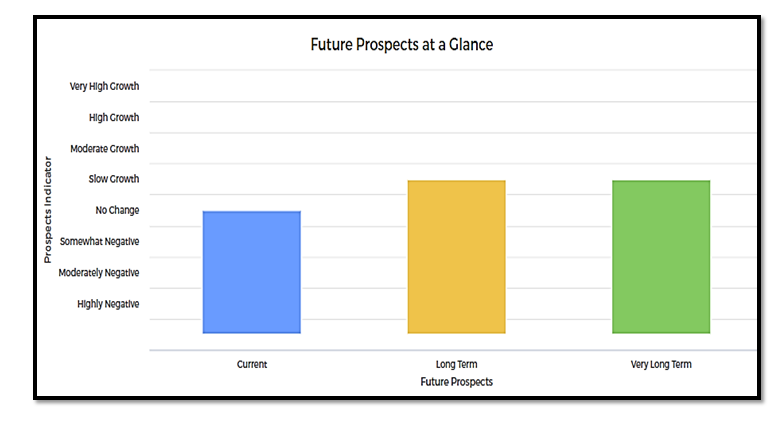Indian Engineering Services Officer
Entry Level Qualification
Graduate
Career Fields
Government & Defense Services
For Specially Abled







Career Entrance Exam
About Career
PARTICULARS | DESCRIPTION |
Name | Indian Engineering Services Officer |
Purpose | Managing Public Works |
Career Field | Government & Defense Services |
Required Entrance Exam | No Entrance Exam |
Average Salary | 10,00,000 - 25,00,000 Rs. Per Year |
Companies For You | Central Power Engineering Service, Indian Telecommunication Service & Many More |
Who is Eligible | Graduate |
Indian Engineering Service Officers are responsible for managing the technical functions of various organisations, agencies, and divisions of the Government of India. The Indian Engineering Service Officers work closely within the four major categories: Civil Engineering, Mechanical Engineering, Electrical Engineering and Electronics and Telecommunication Engineering. They perform all the technical and managerial functions in the field of engineering.
So let’s first understand in brief what exactly the Indian Engineering Services officers do in their specialized field of work:
1. As an Indian Engineering Service Officer (Civil Engineering), you would be responsible for the proper functioning and maintenance of various structures and assets of various Government organisations such as the Indian Railways, Central Public Works Department, Border Roads Organization, etc. You will be responsible for the proper functioning, usage, and maintenance of assets and structures like railway tracks, bridges, buildings, roads, water supply networks, etc. You will also be engaged in the construction of new assets and structure as well as for various other development works.
2. As an Indian Engineering Service Officers (Mechanical Engineering), you would be responsible for improving production processes, designing and implementing cost-effective modifications of various structures and assets of various Government organizations/departments such as Indian Railways, Geological Survey of India, Defence services, Indian Naval Armament services, etc. You will be responsible for researching, designing, evaluating, operating, and maintaining mechanical products, equipment, systems and investigate equipment failures to detect faulty operations.
3. As an Indian Engineering Service Officer (Electrical Engineering) you would be responsible for designing, developing, and testing electrical devices and equipment, including communications systems, power generators, motors and navigation systems, and electrical systems for automobiles and aircraft for various Government organizations/departments such as Indian railways, Indian Defence Services, Defence Aeronautical Quality services etc. You will be responsible for establishing construction, manufacturing or installation standards or specifications by performing a wide range of detailed calculations.
4. As an Indian Engineering Service Officer (Electronics and Telecommunication) You would be responsible for managing the Signalling and Telecommunication (S&T) infrastructure of various Government organizations/departments such as Indian Railways, Indian Naval Armament Services, Indian Radio Regulatory service, etc. You will be responsible for researching, designing and monitoring cellular or cable, wireless and satellite services, ensuring an interference-free spectrum in the Telecommunication and electronics systems.
Indian Engineering Service Officers work in the technical aspects of several areas related to railways, roads, defence, manufacturing, inspection, construction, public works, power, and telecommunications. As an Indian Engineering Service Officer, your work would depend on your choice of engineering discipline and service (or cadre).
5. As an Indian Engineering Services Officer (Civil Engineering), you may find work in any of the following organizations/divisions/departments:
1. Indian Railway Service of Engineers
2. Indian Railway Stores Service (civil engineering posts)
3. Central Engineering Service (CES) (Central Public Works Department)
4. Central Engineering Service (Roads), Group A (civil engineering posts)
5. Survey of India (Group A)
6. AEE (civil) in the Border Road Engineering Service (BRES) (Border Roads Organisation)
7. Indian Defence Service of Engineers
8. AEE (QS&C) in Military Engineer Services (MES) surveyor cadre
9. Central Water Engineering (Group A) Service
10 Indian Skill Development Service
11. P&T Building Works Service (DoT, Ministry of Communications and Information Technology)
6. As an Indian Engineering Services Officer (Mechanical Engineering), you may find work in any of the following organisations/divisions/departments:
1. Indian Railway Service of Mechanical Engineers
2. Indian Railway Stores Service (mechanical engineering posts)
3. AEE in Geological Survey of India (GSI) engineering service (Group A)
4. Indian Defence Service of Engineers
5. Indian Naval Armament Service (INAS) (mechanical engineering posts)
6. Assistant Naval Store Officer Grade I (mechanical engineering posts), Indian Navy
7. AEE (mechanical) Border Roads Engineering Services (Border Roads Organisation)
8. Central Water Engineering (Group A) Service
9. Central Power Engineering Service (Groups A and B, mechanical engineering posts)
10. Indian Skill Development Service
11. Central Electrical and Mechanical Engineering Service (Central Public Works Department)
7. As an Indian Engineering Services Officer (Electrical Engineering), you may find work in any of the following organizations/divisions/departments:
1. Indian Railway Service of Electrical Engineers
2. Indian Railway Stores Service (electrical engineering posts)
3. Central Electrical and Mechanical Engineering Service (electrical engineering posts)
4. Indian Defence Service of Engineers (Military Engineer Services)
5. Assistant Naval Store Officer Grade I (electrical engineering posts), Indian Navy
6. Central Power Engineering Service Group A & Group B
7. Defence Aeronautical Quality Assurance Service/SSO‐II (Electrical)
8. Indian Skill Development Service
9. Indian Naval Armament Service (electrical engineering posts)
8. As an Indian Engineering Services Officer (Electronics and Telecommunication Engineering), you may find work in any of the following organisations/divisions/departments:
1. Indian Railway Service of Signal Engineers
2. Indian Railway Stores Service (telecommunication and electronic engineering posts)
3. Indian Radio Regulatory Service (Group A)
4. Indian Telecommunication Service (Group A)
5. Indian Naval Armament Service (electronic and telecommunications engineering posts)
6. Assistant Naval Store Officer Grade I (E&T posts), Indian Navy
7. Central Power Engineering Service (Groups A and B E&T posts)
8. Indian Skill Development Service
9. Junior Telecom Officer (Group B)
10. Indian Ordnance Factories Service (IOFS) AWM/JTS (E&T posts)
11. Indian Inspection Service Group (E&T posts)
Key Roles and Responsibilities
As an Indian Engineering Services Officer (Civil),you would be involved in the following key roles and responsibilities:
1. You would assist the Senior Technical Officers in planning, preparing designs and estimates of roads/bridges work and scrutiny of proposals for such work received from the States.
2. You would be associated with detailed studies in respect of the design of various components of the water resources projects under the different stages of implementation. There are specialized Directorates on Hydro-civil Design, Concrete, and Masonry Dam Design, Earth and Rockfill Dam design, Barrage and Canal Design and Design of Gates on Hydraulic Structures.
As an Indian Engineering Services Officer (Mechanical),you would be involved in the following key roles and responsibilities:
1. You would assist the Senior Technical Officers headquarters and in the regional offices etc. in planning, procurement, operation and maintenance of roads/bridges construction equipment’s, to prepare estimates for repairs and maintenance of such equipment’s and scrutiny of proposals and estimates received from the States.
2. You would also be involved in the development work to establish import substitutes, preparation of indigenous design specifications. Providing of mechanical, electronics and electrical spares for armaments
3. You would also be rendering technical advice to the service in all matters relating to mechanical, electronic and electrical engineering in respect of armaments
As an Indian Engineering Services Officer (Electronics), you would be involved in the following key roles and responsibilities:
1. You would be involved in the production, planning, control and administration in various departments
2. You would be responsible for achieving the given production targets such as manufacturing of spares, overhaul/repair of equipment’s, technical efficiency of sections under their control, preventive maintenance of plants and machinery, inventory management etc.
3. You would be involved in the planning for Power Development in the country for the optimal utilisation of resources. Collection, Analysis and Publication of data. Design engineering and monitoring, Renovation & modernization, Research and development of power plants including transmission and distribution system. Specifying technical standards, Safety regulations for operation and maintenance of power projects plants, designs or projects etc.
4. You would be involved in the provision of machinery, electronic and electrical equipment for repair, maintenance and overhaul.
As an Indian Engineering Services Officer (Electronics and Telecommunication), you would be involved in the following key roles and responsibilities:
1. You would work in the field of Standardisation of Indian Telecommunication network, preparation of Generic requirements of Telecommunication equipment, utilization of spectrum like in Telecom Engineering Centre (TEC), technology validations and participate in the proceedings of various study groups of standardization bodies like ITU, IETF etc.
2. You would also assist in Telecom Policy formulation, Vigilance, including the Security unit and any other units carrying out the works relating to telecommunications and new as well as converged networks and services.
3. You would be required to contribute immensely through your technical/administrative skills in discharging duties especially in the areas of standardization, evaluation and introduction of technologies, investigation of malpractices and establishment and operations of networks as well as international technical coordination.
Career Entry Pathway
Class 10 all subjects as per scheme of studies - Class 11-12 Physics, Chemistry and Mathematics along with any other subject as per scheme of studies – Bachelors in Civil Engineering/ Construction Engineering/ Structural (Civil) Engineering/ or similar course – Apply for and qualify the UPSC Engineering Services Examination – Become Indian Engineer Service Officer (Civil Engineering)
After completing Class 10 all subjects as per scheme of studies and Class 11-12 Physics, Chemistry and Mathematics along with any other subject as per scheme of studies, you can go for Bachelors in Civil Engineering/Construction Engineering/ Structural (Civil) Engineering/ or similar course. After graduation you must apply for and qualify the Engineering Services Examination and become eligible Indian Engineer Service Officer (Civil Engineering).
Class 10 all subjects as per scheme of studies - Class 11-12 Physics, Chemistry and Mathematics along with any other subject as per scheme of studies – Bachelors in Electrical Engineering/ Electrical & Telecommunication Engineering/ Electrical & Electronics Engineering/ or similar course - Apply for and qualify the UPSC Engineering Services Examination – Become Indian Engineer Service Officer (Electrical Engineering)
After completing Class 10 all subjects as per scheme of studies and Class 11-12 Physics, Chemistry and Mathematics along with any other subject as per scheme of studies, you can go for Bachelors in Electrical Engineering/ Electrical & Telecommunication Engineering/ Electrical & Electronics Engineering/ or similar course. After graduation you must apply for and qualify the Engineering Services Examination and become eligible Indian Engineer Service Officer (Electrical Engineering)
Class 10 all subjects as per scheme of studies - Class 11-12 Physics, Chemistry and Mathematics along with any other subject as per scheme of studies – Bachelor of Mechanical Engineering and Production Technology/ Aeronautical & Mechanical Engineering/ Mechatronics and Robotics/ Aerospace Engineering - Apply for and qualify the UPSC Engineering Services Examination – Become Indian Engineer Service Officer (Mechanical Engineering)
After completing Class 10 all subjects as per scheme of studies and Class 11-12 Physics, Chemistry and Mathematics along with any other subject as per scheme of studies, you can go for Bachelor of Mechanical Engineering and Production Technology/ Aeronautical & Mechanical Engineering/ Mechatronics and Robotics/ Aerospace Engineering. After graduation you must apply for and qualify the Engineering Services Examination and become eligible Indian Engineer Service Officer (Mechanical Engineering).
Class 10 all subjects as per scheme of studies - Class 11-12 Physics, Chemistry and Mathematics along with any other subject as per scheme of studies – Class 11-12 in Science Stream with Physics, Chemistry and Mathematics – Bachelors in Electrical and Electronics (EE)/ Electronics and communication Engineering (ECE)/ Telecommunication Engineering/ Communication and Computer Engineering/ Communication Engineering/ Electronics and Telecommunication/ Control Systems Engineering/ Power Systems Engineering/ or similar course - Apply for and qualify the UPSC Engineering Services Examination – Become Indian Engineer Service Officer (Electronics & Telecommunications Engineering)
After completing Class 10 all subjects as per scheme of studies and Class 11-12 Physics, Chemistry and Mathematics along with any other subject as per scheme of studies, you can go for Bachelors in Electrical and Electronics (EE)/ Electronics and communication Engineering (ECE)/ Telecommunication Engineering/ Communication and Computer Engineering/ Communication Engineering/ Electronics and Telecommunication/ Control Systems Engineering/ Power Systems Engineering/ or similar course. After graduation you must apply for and qualify the Engineering Services Examination and become eligible Indian Engineer Service Officer (Electronics & Telecommunications Engineering).
Class 10 all subjects as per scheme of studies - Class 11-12 Physics, Chemistry and Mathematics along with any other subject as per scheme of studies– Bachelor’s Degree in Engineering or Technology (B.E. or B.Tech.) - Apply for and clear the UPSC Engineering Services Examination – Become Indian Engineer Service Officer
After completing Class 10 all subjects as per scheme of studies and Class 11-12 Physics, Chemistry and Mathematics along with any other subject as per scheme of studies, you can go for Bachelor’s Degree in Engineering or Technology (B.E. or B.Tech.) or similar field. After graduation you must apply for and qualify the Engineering Services Examination and become eligible Indian Engineer Service Officer. (For certain posts/services you can pursue Engineering in any field of discipline to be eligible for Indian Engineering Services examination.)
Class 10 all subjects as per scheme of studies - Class 11-12 Physics, Chemistry and Mathematics along with any other subject as per scheme of studies – Bachelor’s Degree in Engineering - M.Sc. degree or its equivalent (with Wireless Communication Electronics, Radio Physics or Radio Engineering as a special subject) - Apply for and clear the UPSC Engineering Services Examination – Work in Indian Naval Armament Services (Electronics Eng. Post)
After completing Class 10 all subjects as per scheme of studies and Class 11-12 Physics, Chemistry and Mathematics along with any other subject as per scheme of studies, you can go for Bachelor’s Degree in Engineering. After graduation you must go for a M.Sc. degree or its equivalent (with Wireless Communication Electronics, Radio Physics or Radio Engineering as a special subject). After masters you must apply for and qualify the Engineering Services Examination and work in Indian Naval Armament Services (Electronics Eng. Post).
Class 10 all subjects as per scheme of studies - Class 11-12 Physics, Chemistry and Mathematics along with any other subject as per scheme of studies– Bachelor’s Degree in Engineering - Master’s Degree in Science (with Physics and Radio Communication or Electronics or Telecommunication as a special subject) or M.Sc. degree or its equivalent (with Wireless Communication Electronics, Radio Physics or Radio Engineering as a subject) - Apply for and clear the UPSC Engineering Services Examination – Become eligible for Indian Radio Regulatory Service Group ‘A’
After completing Class 10 all subjects as per scheme of studies and Class 11-12 Physics, Chemistry and Mathematics along with any other subject as per scheme of studies, you can go for Bachelor’s Degree in Engineering. After graduation you must go for a Master’s Degree in Science (with Physics and Radio Communication or Electronics or Telecommunication as a special subject) or M.Sc. degree or its equivalent (with Wireless Communication Electronics, Radio Physics or Radio Engineering as a special subject). After masters you must apply for and qualify the Engineering Services Examination and become eligible for Indian Radio Regulatory Service Group ‘A’.
Required Qualification & Competencies
1. After completing Bachelor's in Engineering in Civil, Electrical, Electronics, Mechanical Electronics, and Communications or similar field, you must apply for UPSC Engineering Services Examinations. For certain services or posts, you must also have a Master’s degree or equivalent in engineering or Technology (M.E./M.Tech/M.Sc./ MSEE/ MS) or a similar course.You should be around 21–30 years of age in order to be eligible for the Engineering Services exam.
2. The Engineering Services Examination is conducted by the Union Public Services Commission (UPSC). The exam has three stages- Preliminary Examination, Mains Examination and Interview/Personality Test.
The Engineering Services (Preliminary/Stage‐I) Examination comprises of two objective type (multiple choices) questions papers carrying a maximum of 500 marks (Paper I – 200 Marks & Paper II – 300 Marks).
Paper I - General Studies and Engineering Aptitude Paper
1. Current issues of national and international importance relating to social, economic and industrial development
2. Engineering Aptitude covering Logical reasoning and Analytical ability
3. Engineering Mathematics and Numerical Analysis
4. General Principles of Design, Drawing, Importance of Safety
5. Standards and Quality practices in production, construction, maintenance, and services
6. Basics of Energy and Environment: Conservation, Environmental pollution, and degradation, Climate change, Environmental impact assessment
7. Basics of Project Management
8. Basics of Material Science and Engineering
9. Information and Communication Technologies (ICT) based tools and their applications in Engineering such as networking, e-governance, and technology-based education.
10. Ethics and values in the engineering profession
PaperII -Engineering Discipline (E.g. Civil Engineering/Electrical Engineering/Mechanical Engineering/ Electronics and Communications Engineering)
The Engineering Services (Mains/Stage-II) Examination comprises of two compulsory papers carrying a maximum of 600 marks (Paper I & Paper II of 300 marks each)
Paper I –Engineering Discipline- I(300 Marks)
Civil Engineering:
1. Building Materials
2. Solid Mechanics
3. Structural Analysis
4. Design of Steel Structures
5. Design of Concrete and Masonry structures
6. Construction Practice, Planning and Management
Mechanical Engineering:
1. Fluid Mechanics
2. Thermodynamics and Heat transfer
3. IC Engines, Refrigeration and Air conditioning
4. Turbo Machinery
5. Power Plant Engineering
6. Renewable Sources of Energy
Electrical Engineering:
1. Engineering Mathematics
2. Electrical Materials
3. Electric Circuits and Fields
4. Electrical and Electronic Measurements
5. Computer Fundamentals
6. Basic Electronics Engineering
Electronics & Telecommunication Engineering:
1. Basic Electronics Engineering
2. Basic Electrical Engineering
3. Materials Science
4. Electronic Measurements and Instrumentation
5. Network Theory
6. Analog and Digital Circuits
Paper II – Engineering Discipline – II (300 Marks)
Civil Engineering:
1. Flow of Fluids, Hydraulic Machines and Hydro Power
2. Hydrology and Water Resources Engineering
3. Environmental Engineering
4. Geotechnical Engineering and Foundation Engineering
5. Surveying and Geology
6. Transportation Engineering
Mechanical Engineering:
1. Engineering Mechanics
2. Engineering Materials
3. Mechanisms and Machines
4. Design of Machine Elements
5. Manufacturing, Industrial and Maintenance Engineering
6. Mechatronics and Robotics
Electrical Engineering:
1. Analog and Digital Electronics
2. Systems and Signal Processing
3. Control Systems
4. Electrical Machines
5. Power Systems
6. Power Electronics and Drives
Electronics & Telecommunication Engineering:
1. Analog and Digital Communication Systems
2. Control Systems
3. Computer Organization and Architecture
4. Electro Magnetics
5. Advanced Electronics Topics
6. Advanced Communication Topics
The Third stage (Personality test) comprises of 200 marks which assess the suitability of a candidate for the Civil Services. It may assess the following attributes in a candidate (these are only indicative and do not comprise all the criteria):
1. Analytical and logical abilities
2. Balance of judgement
3. Compassion and empathy
4. Critical abilities
5. Deductive and Inductive Reasoning abilities
6. Ethical thinking
7. Integrity and morality
8. Intellectual abilities
9. Interpersonal abilities
10. Leadership abilities
11. Multi-faceted interests and depth of interests
12. Power of expression
13. Self-awareness or intra-personal abilities
14. Understanding of social issues and challenges
MINIMUM EDUCATION REQUIRED | MAXIMUM EDUCATION REQUIRED |
Under Graduate Undergraduate Degree / Honours Diploma / Graduate Diploma (equivalent to a Degree) Programs for which the minimum eligibility is a pass in Higher Secondary / Class XII School Leaving examination. | Post Graduate Postgraduate Degree / Diploma / Certificate Programs for which the minimum eligibility is a pass in Graduation / equivalent Diploma program like Honours Diploma or Graduate Diploma. |
Competencies Required
Interests
1. Investigative: You should have interests for Investigative Occupations. Investigative occupations involve working with ideas and quite a lot of thinking, often abstract or conceptual thinking. These involve learning about facts and figures; involve use of data analysis, assessment of situations, decision making and problem-solving.
2. Realistic: You should have interests for Realistic Occupations. Realistic occupations involve more practical and hands-on activities than paperwork or office work. Realistic occupations often involve physical activities for getting things done using various tools and equipment.
3. Conventional: You should have interests for Conventional Occupations. Conventional occupations involve repetitive and routine tasks as well as fixed processes or procedures for getting things done. These occupations involve working more with data, systems, and procedures and less with ideas or creativity.
Knowledge
1. Engineering and Technology: Knowledge of various applications of one or more branches of Engineering Science & Technology to manufacture and produce various goods or construct or erect various structures. This includes knowledge about design, development, prototype testing, manufacturing, construction, installation, repair and maintenance.
2. Mathematics: Knowledge of arithmetic, algebra, geometry, calculus, trigonometry, statistics, and other mathematical disciplines and their applications.
3. Physical Science: Knowledge of physical principles, laws, their interrelationships, and applications to understand fluid, material, earth, ocean, atmosphere, and space dynamics, as well as mechanical, electrical, atomic and sub- atomic structures, properties and processes.
4. Production and Processing: Knowledge of raw materials, production machinery, production systems, production processes, quality control, and other techniques for manufacturing or construction and distribution of goods.
5. Technical and Engineering Design: Knowledge of various techniques, methods, specifications and tools for creating, developing and laying out designs of various machines, equipment, devices, manufacturing plants, structures, systems and processes. This includes developing blueprints, drawing and models.
Skills
1. Active Learning: Focused and continuous learning from various sources of information, observation and otherwise for application in getting work done.
2. Communication in English: Skills in communicating effectively in writing as well as verbally with others in the English language.
3. Coordination: Skills in working together with other people to get things done.
4. Critical Thinking: Skills in analysis of complex situations, using of logic and reasoning to understand the situations and take appropriate actions or make interpretations and inferences.
5. Judgment and Decision Making: Skills in considering the pros and cons of various decision alternatives; considering costs and benefits; taking appropriate and suitable decisions.
6. Operations and Process Analysis: Skills in the analysis of operations and processes such as industrial manufacturing, chemical processing, etc. so as to device better and more efficient operational processes and systems.
7. Problem Solving: Skills in analysis and understanding of problems, evaluating various options to solve the problems and using the best option to solve the problems.
8. Process and Operation Controlling: Skills in controlling processes and operations of various machines, equipment, devices and systems using different types of electrical and electronic control instruments and systems.
9. Reading Comprehension: Skills in understanding written sentences and paragraphs in work related documents.
10. Supervising: Skills in Supervising and monitoring the performance of others, businesses, and different projects.
11. Technical: Skills in using various technologies and technical methods to get things done or solve problems.
12. Technical Design and Drawing: Skills in creating and developing designs and drawings for various structures, machines, equipment, and devices.
13. Troubleshooting: Skills in determining causes of operating errors and deciding what to do about it
Abilities
1. Abstract Reasoning: The ability to understand ideas that are not expressed in words or numbers; the ability to understand concepts that are not clearly expressed verbally or otherwise.
2. Deductive Reasoning: The ability to apply general rules and common logic to specific problems to produce answers that are logical and make sense. For example, understanding the reasons behind an event or a situation using general rules and common logic
3. Inductive Reasoning: The ability to combine pieces of information from various sources, concepts, and theories to form general rules or conclusions. For example, analyzing various events or situations to come out with a set of rules or conclusions
4. Inter-Personal: The ability to build and maintain good relationships with others at workplaces and elsewhere.
5. Mathematical Reasoning: The ability to choose the right mathematical methods or formulas to solve a problem.
6. Mechanical Reasoning: The ability to apply basic physical principles and theories to understand how mechanical objects such as tools and machinery works and the ability to understand the rules or laws governing the work of machinery, tools and bodies in motion.
7. Numerical Reasoning: The ability to add, subtract, multiply, divide, and perform other basic numerical calculations correctly.
8. Spatial Ability: The ability to visualise three dimensional objects by looking at the objects in paper or visualise objects mentally in three dimensions.
9. Speed of Closure: The ability to quickly make sense of, combine, and organize information into meaningful patterns.
10. Verbal Reasoning: The ability to think and reason with words; the ability to reason out ideas expressed in words.
11. Written Comprehension: The ability to read and understand information and ideas presented in writing.
Personality
1. You are always or mostly organized in your day-to-day life and activities.
2. You always feel secure in your surroundings and in most situations.
3. You are imaginative sometimes.
4. You prefer to experience new things and have new experiences sometimes.
5. You act independently sometimes but do not do so in some other times.
6. You are friendly and outgoing sometimes, but not always. You prefer the company of people sometimes but not always.
7. You are always practical or in most situations.
Career - Job Opportunities & Profiles
As Indian Engineering Officer you would be appointed as Assistant Executive Engineer on probation for two years. You would be enlisted in the following categories:
1. Civil Engineering
2. Mechanical Engineering
3. Electrical Engineering
4. Electronics and Telecommunication Engineering
As an Indian Engineering Officer you will be recruited in the following Organizations/Cadres:
1. Central Power Engineering Service
2. Indian Telecommunication Service
3. Indian Navy Armaments Service
4. Border Roads Engineering Service
5. Indian Railways Service
6. Central Engineering Service for Roads
7. Central Water Engineering
8. Geological Survey of India
9. Indian Ordnance Factory
10. Indian Supply Service
11. Defense Service Engineering Corps
12. Central Electrical and Mechanical Service
13. Indian Army Engineering Service
Career Growth
1. Initially, you will begin as Assistant Executive Engineer. After gaining an experience of at least 3-4 years you will be promoted to Executive Engineer. You will work for 13 years to be appointed as a Superintending Engineer. With 20 or more years of experience you will become eligible to be appointed as the Chief Engineer and with 30 years of experience you will become the Additional Director General. The highest position in the IES is of Director General and it can be attained with a minimum experience of 34 years.
2. Assistant Executive Engineer - Executive Engineer – Executive Engineer (Non- Functional Action Grade) - Superintending Engineer - Chief Engineer - Additional Director General - Director General & Special Secretary
Salary Offered
According to the 7th Central Pay Commission,
1. As Assistant Executive Engineer, you would earn around Rs.74,337 – 2,26,087 per month.
2. As Executive Engineer, you would earn around Rs.88,837 – 2,65,087 per month.
3. As Superintending Engineer, you would earn around Rs.1,02,712 – 2,65,712 per month.
4. As Chief Engineer, you would earn around Rs.1,58,087 – 2,74,087 per month.
5. As Director General, you would earn around Rs.1,84,462 – 2,76,962 per month.
The higher figures of the salary ranges mentioned above indicate the salaries at the highest point of the scale. This means, for example, when you join as an Assistant Executive Engineer, you get about Rs. 74,337 a month but even if you do not get any promotion, you will receive salary increments every year. So In case you retire as an Assistant Executive Engineer, you will be drawing about Rs. 2,26,087 a month.
Monthly Earning In Indian Rupee
Entry Level | Junior Level | Mid Level | Senior Level | |||||
Min Earning | Max Earning | Min Earning | Max Earning | Min Earning | Max Earning | Min Earning | Max Earning | |
74337 | 226087 | 88837 | 265087 | 158087 | 274087 | 184462 | 276962 | |
1. Entry level: 0 - 2 years of work experience
2. Junior Level: From 1 to 12 years of work experience
3. Mid Level: From 5 to 20+ years of work experience
4. Senior Level: From 10 to 25+ years of work experience
Work Activities
1. Analysing and interpreting data and information: Analysis of data and information to find facts, trends, reasons behind situations, etc.; interpretation of data to aid in decision making.
2. Calculating and computing: Calculating or computing using various mathematical formula and functions using computers or otherwise; doing financial or commercial calculations or computations.
3. Communicating with co-workers and others: Communicating with people in writing, verbally or otherwise inside your workplace and various other people who have professional relationships with your place of work including vendors, government officials, etc. or with people at large.
4. Decision making and problem-solving: Analysis of data and information; evaluation of alternative decisions and results of decisions; taking the right decisions and solving problems.
5. Drawing, drafting, laying out and specifying objects, equipment, devices, tools, and systems: Creating and developing designs, drawings, layouts and specifications about how to construct, manufacture, assemble, build, use, and maintain various equipment, devices, tools and systems.
6. Estimating quantity, cost, time and resources: Estimating sizes, volumes, distance, and quantity; estimating and determining time, costs, and resources; estimating materials required to perform a task.
7. Getting Information and learning: Observing, hearing, reading, using computers, or otherwise obtaining information and learning from it.
8. Inspecting equipment, systems, structures, and materials: Inspecting equipment, systems, structures, and materials to ascertain quality, performance, defects, causes of errors, etc.
9. Leading: Inspiring and motivating co-workers to work to achieve specific goals; enabling and facilitating others to perform tasks effectively; addressing issues and solving problems in order to help people perform well.
10. Managing and supervising: Managing and supervising work of others; setting goals; giving instructions; monitoring work performance, etc.
11. Organising, planning and prioritising tasks: Planning and organising tasks in order to achieve work goals; prioritising tasks to achieve goals and making the best use of the time available.
12. Scheduling tasks: Scheduling project timelines, tasks and activities.
13. Updating and using relevant knowledge: Keeping updated with the latest knowledge relevant to your fields of work and use of the relevant knowledge in getting things done
14. Using computers for work: Using computers for day-to-day office work; using computer software for various applications in day-to-day professional work; entering data and process information; for writing.
15. Working in a team: Working in a team of people; developing team; maintaining professional relationships among team members.
Future Prospects
1. According to the 68th Annual Report submitted by Union Public Service Commission, a total number of 3,25,604 candidates applied for the Engineering Services Examination. A total of 1,54,995 candidates appeared in the written examination, Stage-I/Engineering Services (Preliminary) and only 1413 candidates qualified for the Personality Test out of which only 500 candidates were recommended to the panel.
2. The number of vacancies in Civil Engineering, Mechanical Engineering, Electrical Engineering and Electronics and Telecommunication Engineering were 291, 142, 65 and 50 respectively. According to the data estimated in the Annual Report, out of the 500 candidates recommended for appointment, 258 candidates or 51.6 %were recommended for Civil Engineering posts, 135 candidates or 27.0 % for Mechanical Engineering posts, 59 candidates or 11.8 % for Electrical Engineering posts and 48 candidates or 9.6 % for Electronics and Telecommunication Engineering posts. Therefore Indian Engineering Services examination is very competitive but offers lucrative job opportunities and perks.
Future Prospects At A Glance
Current (0-1 year) | Long Term (2-5 year) | Very Long Term (6-10 years) |
No Change | Slow Growth | Slow Growth |

